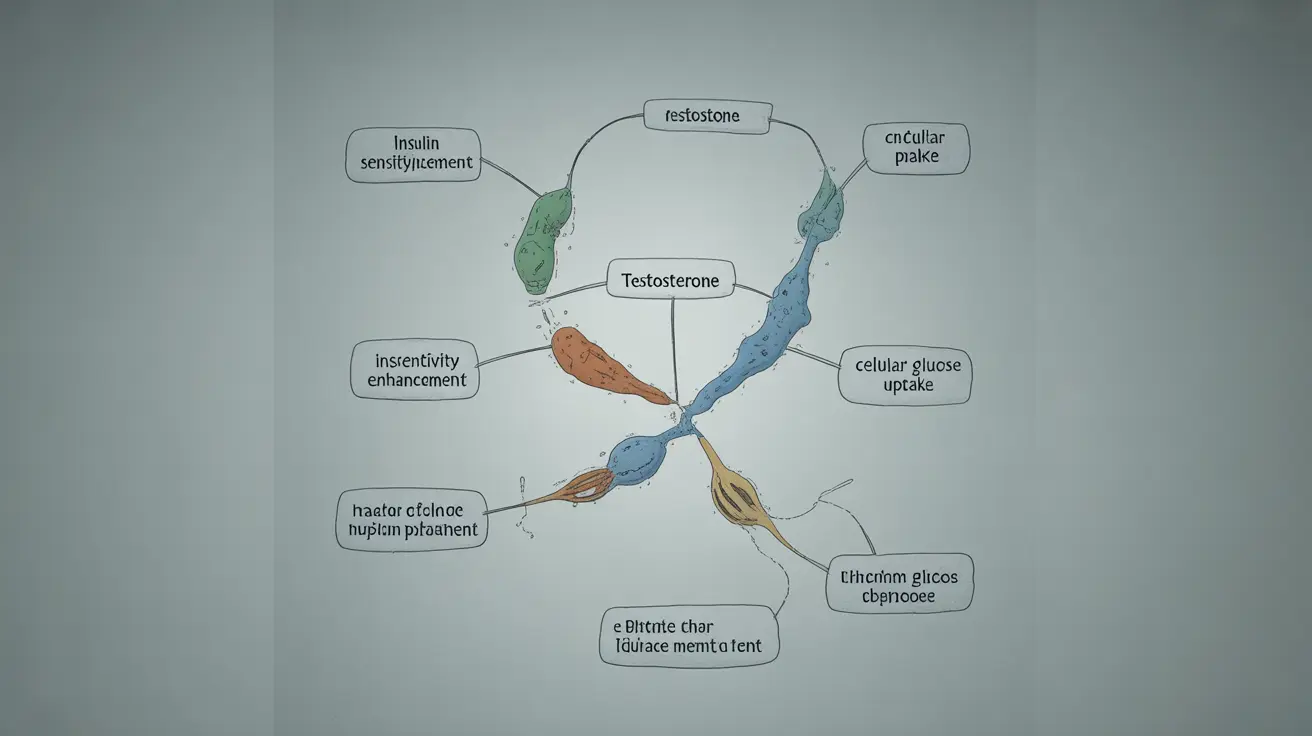The intricate connection between testosterone and blood sugar levels plays a crucial role in men's health, affecting everything from metabolism to diabetes risk. Understanding this relationship is essential for managing both hormonal health and blood sugar regulation effectively.
Recent research has revealed significant links between testosterone levels and glucose metabolism, making it increasingly important for healthcare providers and patients to consider both factors when addressing related health concerns.
Understanding Testosterone's Impact on Blood Sugar Regulation
Testosterone plays a vital role in how the body processes and manages blood sugar. This hormone helps improve insulin sensitivity, allowing cells to better absorb glucose from the bloodstream. When testosterone levels fall below normal ranges, this process can become impaired, potentially leading to insulin resistance.
Men with low testosterone often experience difficulties maintaining healthy blood sugar levels, which can contribute to the development of type 2 diabetes and other metabolic disorders.
The Cyclical Nature of Low Testosterone and Diabetes
A complex bidirectional relationship exists between testosterone levels and diabetes. Low testosterone can increase the risk of developing type 2 diabetes, while diabetes itself can contribute to reduced testosterone production, creating a challenging cycle that requires careful management.
Key Mechanisms at Work
Several biological processes connect testosterone and blood sugar regulation:
- Insulin sensitivity enhancement
- Muscle mass maintenance
- Fat distribution regulation
- Metabolic rate influence
- Blood sugar uptake promotion
Signs and Symptoms of Low Testosterone Affecting Blood Sugar
When testosterone levels decline, several symptoms may emerge that can impact blood sugar regulation:
- Increased abdominal fat
- Decreased muscle mass
- Persistent fatigue
- Difficulty losing weight
- Increased insulin resistance
Treatment Approaches and Management Strategies
Testosterone Replacement Therapy (TRT)
For men with clinically low testosterone levels, TRT may be prescribed to help normalize hormone levels and potentially improve blood sugar control. However, this treatment requires careful monitoring and should only be undertaken under medical supervision.
Lifestyle Modifications
Several lifestyle changes can help manage both testosterone levels and blood sugar:
- Regular resistance training
- Maintaining a healthy weight
- Getting adequate sleep
- Following a balanced diet
- Reducing stress levels
- Limiting alcohol consumption
Prevention and Long-term Management
Taking proactive steps to maintain healthy testosterone levels and blood sugar control can help prevent related health complications. Regular medical check-ups, hormone level monitoring, and blood sugar testing are essential components of an effective management strategy.
Frequently Asked Questions
How does low testosterone affect blood sugar and insulin resistance in men?
Low testosterone can decrease insulin sensitivity, making it harder for cells to absorb glucose from the bloodstream. This can lead to insulin resistance and elevated blood sugar levels, potentially increasing the risk of type 2 diabetes.
Can testosterone replacement therapy help improve blood sugar control in men with type 2 diabetes?
Research suggests that testosterone replacement therapy may help improve blood sugar control in men with both low testosterone and type 2 diabetes by enhancing insulin sensitivity and improving muscle mass, which aids in glucose metabolism.
What are the symptoms of low testosterone that might indicate problems with blood sugar regulation?
Common symptoms include increased belly fat, reduced muscle mass, fatigue, difficulty losing weight, and increased hunger or thirst. These symptoms can indicate both low testosterone and potential blood sugar regulation issues.
Is there a link between obesity, low testosterone, and higher risk of type 2 diabetes?
Yes, there is a strong connection between these conditions. Obesity can lead to lower testosterone levels, while low testosterone makes it easier to gain weight and harder to maintain healthy blood sugar levels, increasing the risk of type 2 diabetes.
What lifestyle changes can help manage both testosterone levels and blood sugar more effectively?
Key lifestyle changes include regular strength training, maintaining a healthy weight, getting adequate sleep (7-9 hours), following a balanced diet rich in protein and healthy fats, managing stress, and limiting alcohol consumption.




